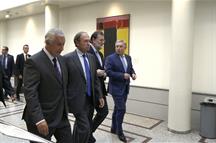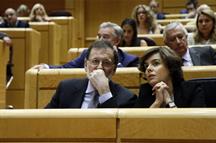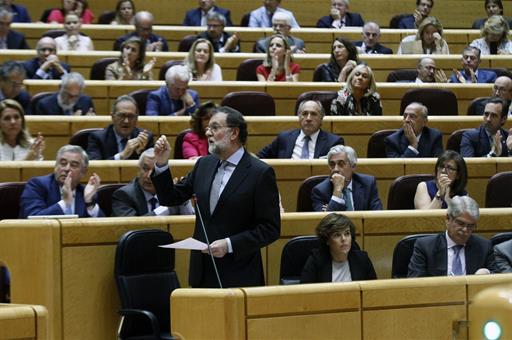Government control session in Upper House of Parliament
"You have divided the Regional Parliament of Catalonia and Catalan society", says Mariano Rajoy
President's News - 2017.9.12
Upper House of Parliament, Madrid
During his speech at the government control session held in the Upper House of Parliament, the President of the Government reiterated that he refuses to authorise the call for a referendum to wipe out national sovereignty in Catalonia because "that is what the Constitution, the law and common sense all dictate". He also stressed that the State paid the debt maturities and the deficit in this region to avoid it going bankrupt, and in order to cover basic public services, pay suppliers and to ensure that the citizens of Catalonia suffered no detriment.
This was the response offered by Mariano Rajoy to the Member of the Upper House for the National Parliamentary Group (Spanish acronym: GPN), Josep Lluís Cleries, who accused him of preventing democracy operating and of abandoning the people of Catalonia.
The President of the Government repeated that he had informed the President of the Regional Government of Catalonia, Carles Puigdemont, that "he was unable to negotiate the issue of a referendum because a referendum is non-negotiable". He also asked Josep Lluís Cleries not to talk about democracy, liberty or human rights when the PDeCat has tried at two parliamentary sittings to wipe out the Spanish Constitution, the Statute of Autonomy of Catalonia and all the principles that formed the basis of legality, the most important being national sovereignty.
In his opinion, the pro-independence parties also attacked the rights of the MPs in the Regional Parliament of Catalonia, "who were unable to defend their positions in these debates", and are now "threatening the mayors who are opposed to their approach, as Mr Puigdemont did yesterday".
"You have divided the Regional Parliament of Catalonia and Catalan society. And you are now threatening journalists and mayors who refuse to follow your orders", underlined the President of the Government.
We will not accept a totalitarian approach
 Pool Moncloa / J.M. CuadradoMariano Rajoy thanked the Socialist Member of the Upper House Andrés Gil for his party's support on this matter. "I believe it is very important that, on an issue of this nature, we are united because we all seek the same thing".
Pool Moncloa / J.M. CuadradoMariano Rajoy thanked the Socialist Member of the Upper House Andrés Gil for his party's support on this matter. "I believe it is very important that, on an issue of this nature, we are united because we all seek the same thing".
The President of the Government accepted the proposal from Andrés Gil to respond to the problems of Catalonia, based on dialogue without exclusions and on the need to make political headlines because "we are faced with a situation in which the basic values and principles of our way of life together are at stake".
In this regard, he insisted that the Regional Parliament of Catalonia has tried to wipe out the rules that govern our co-existence, based on an alternative legality in just five hours without the legitimacy to do so, robbing the people of Spain of their sovereignty and sidestepping all the democratic channels". It also ignored the legal opinions issued by the Catalan institutions, the legal counsel of the Regional Parliament of Catalonia and the Council for Statutory Guarantees.
"We cannot, under any circumstances, accept, in a nation that is a well-established democracy, one of the most important in the world and clearly one of the most important in Europe, these totalitarian, anti-democratic approaches that seek to run roughshod over the rights of all our citizens", concluded the President of the Government.
Defence of judicial guarantees
 Pool Moncloa / J.M. CuadradoThe President of the Government also responded to the question asked by the Member of the Upper House, Jokin Bildarratz, from the Basque Nationalist Party (Spanish acronym: PNV), on the reasons why the government appealed against Law 12/2016, of 28 July, on the recognition of and redress for the victims of human rights violations in the context of politically-motivated violence in the Autonomous Region of the Basque Country between 1978 and 1999.
Pool Moncloa / J.M. CuadradoThe President of the Government also responded to the question asked by the Member of the Upper House, Jokin Bildarratz, from the Basque Nationalist Party (Spanish acronym: PNV), on the reasons why the government appealed against Law 12/2016, of 28 July, on the recognition of and redress for the victims of human rights violations in the context of politically-motivated violence in the Autonomous Region of the Basque Country between 1978 and 1999.
Mariano Rajoy highlighted that, before lodging this appeal on the unconstitutional nature of this law, it was subject to negotiations at the Bilateral Committee on Cooperation between the State and the Autonomous Region of the Basque Country. The government also based its decision on the opinions in favour of this appeal from the Council of State and the Ministries of Home Affairs, of Justice and of Health.
The President of the Government specified that this appeal does not affect the law as a whole approved by the Autonomous Region of the Basque Country, but rather a few of its articles. The main reason, he explained, is that the law sets up an assessment committee as the collegiate administrative body, the main function of which is to handle the procedures to recognise the status of a victim of a human rights violation. "We are challenging the creation of this committee because it is allocated functions to investigate events that constitute criminal offences as contained in the Criminal Code, and that is a jurisdictional function, here and anywhere else in the world", he argued.
Mariano Rajoy added that the procedure provided for in the law may affect the essential content of fundamental rights. "Whenever someone says that a victim exists, there is also a culprit, and that culprit cannot be declared to be guilty by an administrative committee because this prejudices the effective legal protection as assigned under Article 24 of the Constitution, the presumption of innocence, the judge pre-determined by the law, the adversarial process with all due guarantees and the right to honour, privacy and one's own image", he argued.
Non official translation





